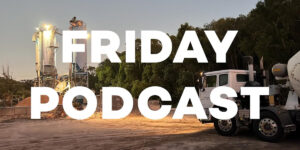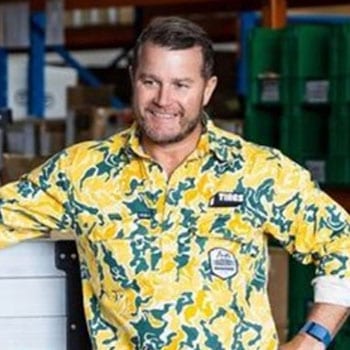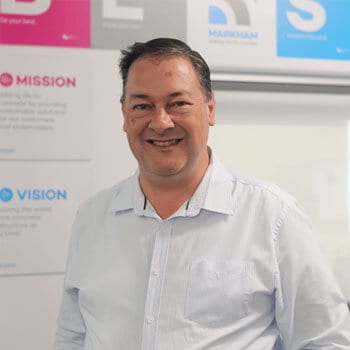Have you seen those colourful Trademutt shirts on site? They’re a conversation starter! This is a very special segment, in which Jason Banks shares the Trademutt and TIACS story – how they started, snapshots from the journey, and where they’re headed. TIACS is a growing mental health support organisation for tradies, truckies, farmers, rural blue collar workers – and those around them. How can we start conversations in the workplace? Why do the shirts display ‘You’ll Never Walk Alone’? And what is the QR code, hidden under the pocket flap? Dive in, learn more, and find out how you can be supported when you’re struggling, or be able to help others with a simple conversation.
Starting Good Conversations

Invisible Strength
Starting Good Conversations
/
RSS Feed
Starting Good Conversations
View the Transcript
BRENDAN: Well, g’day everybody. Great to have you listening again to MARKHAM’s Invisible Strength podcast series, Next Level! And today we are privileged to have with us Jason Banks of TIACS. Jason is Head of Partnerships for TIACS – TIACS stands for “This Is A Conversation Starter” – and he’s actively involved in promoting better practises for blue collar mental health. Jason, welcome aboard!
JASON: Oh, thanks so much Brendan. It’s great to be here this morning and have the opportunity to be able to share what’s happening in the mental health space, and what we’re doing here at TIACS, and a bit of a background story as well.
BRENDAN: Very good. And yes, I guess this conversation sort of started with the visibility of the Trademutt shirts on sites. I’ve got a construction site just around the corner. We’re literally seeing that being embraced by a lot of the guys. Can you tell us what those, that’s about?
JASON: Yes, definitely. Well, they do stand out. They are a bit eye catching and funky, but they’re out there. But there is a story that sits behind the trademark work shirts and the brand.
And, you know, if I wind back the clock, back to 2015, is really when sort of things started to take place. And you know, we’ve got two co-founders that started Trademutt and TIACS, Ed and Dan, both chippies themselves. And back in 2015, actually, Ed was Dan’s apprentice. At the time he was doing a mature age apprenticeship, and they met on a building site. And that’s how the relationship and their friendship sort of started. And then when we were going through the motions of 20015, Dan also had a best mate who was also called Dan, and both the boys were on a building site in 2015, a residential building site here in Brisbane and Dan received a phone call. He still recalls it really vividly that, you know, he was standing on a ladder and Ed was passing, you know, some gyprock sheets up to him. And he got a phone call from his best mate, Dan, telling him that he had the opportunity and just got notified that he’s starting a mature age apprenticeship as a chippy as well, so, you know, the boys’ emotion, especially Dan’s emotion, you know, was running high that his best mate was actually sort of following in similar footsteps to what he was, as following down the trade path. And that always sits vividly in his mind because it was that emotion, and that sort of exhilaration that, you know, he was able to help, support, his best mate along that journey.
But unfortunately, if we wind the clock forward, three days, that emotion quickly changed; when Dan got a phone call that his best mate had taken his own life the night before, here in Brisbane. So you go from the highs of, you know, finding out that your best mate had been given an opportunity of a lifetime, I guess. And then, you know, a few days later you run through the emotions of, you know, losing your best mate, only a few days after that.
So yes, it was a bit of a challenging time for the boys. You know, Ed was always… he was Dan’s apprentice. So really, Dan was Ed’s support. But the tides change very quickly, where Ed became Dan’s support crew through that process. And you know, Dan often talks about that, you know, as a chippy on a building site for, you know, through his apprenticeship, but also through his trade, that mental health wasn’t really spoken about much. You know, guys’ feelings, we didn’t… males, we weren’t, they weren’t opening up on building sites.
And this sort of started to get them thinking that through adversity, and losing a best mate, you know, How can we change the industry? Or, How can we change how people look at mental health, and just start conversations? So I think that’s a really good segue into what you’re saying, that you’re seeing lots of shirts around there, Brendan.
BRENDAN: That’s good. So that’s really the background, then, to “This Is A Conversation Starter”.
JASON: Yes. Well, the boys are… being two young guys, they were only in their 20s. They sort of, for the next couple of years after that, tried to think of ways they were… They wanted to make… High-vis is pretty boring when it’s just high-vis and blue. So they sort of had this idea of, you know, if we… How can we start conversations in the workplace? And you know, that’s when they came up with the idea of, you know, Let’s get some funky eye-catching shirts, start conversations!
And embossed on all their shirts is the very beginning, it says THIS IS A CONVERSATION STARTER. And the shirts are, you know, as you know, you see them out and about on the sites, and down the road in Bundy; you’ll see them. They do start conversations!
So with the money that they’d saved up, in 2018 they went and purchased 1500 work shirts and two laptops. And they launched the business Trademutt, a workwear business. And as they say, there were two ways they could go. One, it was going to take off and was going to be really, really successful. They’re going to start conversations. Or the other one was, they’re going to be stuck with 750 shirts each to wear through their lifetime! – ranging sizes from Small to 2XL, so it would have adjusted for their weight gains and weight losses through their trade! So that’s when Trademutt was born in 2018.
BRENDAN: Yes, that’s very good. So moving into that, the TIACS organisation, then, what’s the next steps? How does TIACS work, as it jumped from the shirts, so to speak?
JASON: Yes, well, the. The boys back in 2018 when they launched Trademutt and, you know, people started to buy the shirts and, you know, start conversations on the work sites and out in the community – they then realised that people were reaching out and buying the shirts, but they had nowhere to direct them for further support in the industry. And you know, there’s lots of great organisations out there in, in the mental health space in Australia that are doing an amazing job. But what they felt was that a lot of it was probably more pushed – or more tended to be – at the end-of-crisis care or high intervention as such, around mental health.
And they also wanted to be able to put some of their profits… They wanted to put their profits back into a mental health organisation and become a social enterprise. And in Australia, 50% of your profits have to go to a charity in Australia, so they could have had the choice of giving it to other mental health organisations. But in true Dan and Ed style – you know, get going and having a crack and, entrepreneurial; they went, You know what? There’s something missing here for the blue-collar industry, you know, tradies and truckies and farmers and stuff, that there’s not a lot of access out there that they can get direct mental health counselling support.
So they founded TIACS, which is the acronym for ‘This Is A Conversation Starter’. And just the logo itself or the word TIACS is a conversation starter, because a lot of people want to know what it means! So everywhere along the point of the journey, we’re always having conversations about it. And TIACS was born in 2020. We essentially took our first phone call from a guy who was sitting in his ute here in Brisbane, actually, who reached out to us, you know, to get some counselling support. So they sort of, you know, the way I sort of explain it is, the shirts are there to start the conversations; and TIACS is there to really continue the conversation, when people need a little bit more extra support, or they have exhausted their own support crew, and they just want to get, you know, back on track quickly. So that’s when we come into it, is there. So yes, so both the boys are co-founders of both mental health organisations, but both starting conversations and continuing the conversations.
BRENDAN: Yes, that’s excellent. That’s very good. But interesting what you say about your target audience, are the tradies and then the truckies, and the farmers. I had noticed a little bit of the focus of your social media on the farming side, which yes, I can quite understand, it is important, there is a lot of pressure there, good times and bad times.
JASON: Yes, definitely. And I think when we look at our, you know, our catch phrase is. TIACS provides free mental health counselling to tradies, truckies, rural, blue-collar workers, and those that care about them, you know. So we capture, you know, a fair big proportion of, you know, of Australia. When we capture that. And we know through our call volumes and our callers that are reaching out to us: close to 20% of our callers are from the construction industry, directly. That’s since we’ve started. And since we did start, we’ve supported over 16,000 clients or individuals in Australia. We’ve had over 14,500 conversations with people on the phone or via text; and put close to $2.5 million of market value services back into the community for free. Because we actually… this is a free service. And I probably, when I talk about TIACS. Is, you know, we’re a call tech service. We offer up to 8, you know, counselling sessions for free.
Our mission is to remove the physical barriers, which means you actually don’t have to get into a car. You don’t have to go and visit someone face to face. You can do it, whether it’s on a building side or in a donga on a mining site, or in a shed on a farm; you can call or text us. Then we’re removing the financial barriers associated with accessing mental health support; because it’s free; and we’re removing the social barriers; that it’s OK to open up and it’s OK to reach out, you know, when things are not going so great. So when we look at it across that board, to be able to support that many people in the short time that we’ve been sort of operating, from an idea that started with funky eye-catching shirts, you know, it is really humbling.
But we know there’s a lot more that we can be doing out there in the community to support those people. And close to 10% of our callers are truckies. And, you know, farmers are up to 6-7%. And only just recently in the last few weeks they released the Farmers’ Health and Wellbeing Report, the National Farmers Federation, around the impacts of mental health and suicide within the industry. From drought to flood; and just about to go through probably… the next sort of prediction is to go through another lot of droughts. And you know, the statistics are pretty alarming in that space. And if you think about blue-collar industry, you know, without farmers; without truckies; without tradies, Australia stops, pretty much.
BRENDAN: Yes, absolutely.
JASON: So yes. So that, that’s pretty much our target audience. But we do capture those that care about them as well.
BRENDAN: Yes, yes, that’s important too. Have seen that situation where it can be very stressful for the friends and family, and not necessarily knowing how… wanting to help but not knowing how to.
JASON: Yes, definitely. And we get lots of those questions where it’s a partner or a loved one ringing up and saying, Hey, you know, how can I support? or, My partner or loved one doesn’t feel comfortable calling. Can someone call them, call him or her back? You know, 60% of our callers are male, which is great, because it’s traditionally, you know, males are not really good… We’re not good at opening up. But you know 60% of our callers are male, and over 70% of our callers, this is probably the statistic… And we capture lots of data. And the reason why we capture lots of data is so that we can actually show that to people that are actually giving us funding, that this is the impact, the social impact they’re having, you know, by supporting an organisation like TIACS.
But over 70% of our callers have never reached out for mental health support before. So that means that the text, the call, this is targeted to this industry; that they feel comfortable and it’s relatable to their environment and where they’re working, which is a really for us and the boys definitely; their vision is to be the mental health support service that you tell your mates about. We’re living it every day.
BRENDAN: That’s excellent. Yes, I can definitely see the practical application of it, which is really good. Make it easy for people to get in touch without any stigma about it.
JASON: Yes, definitely. I mentioned earlier that there’s lots of great organisations doing amazing work in this space. For us, it’s about making sure that we give action. You know, it’s about action that we’re providing a service. You know, when somebody is maybe working on a building site or out on a farm or in a truck on a roadhouse – there’s lots of literature out there around what you need to be doing to manage and maintain your mental health. But sometimes people just want to know, How do I just talk to somebody? or How do I talk to somebody? and you know, for us that’s… even though we’ve had 16,000 people already reach out to us, that is not enough. We want people to think about that like you go to the gym, or go for a walk for your physical fitness, think about just calling TIACS for your mental fitness.
You know, things might be OK at the moment, but you know that you’re coming up for a bit of a rough patch with work or relationships: get on the front foot, call us, talk to a counsellor. You get the same counsellor through your whole process. So if you’re only… if you’re on board for a few sessions, it’s the same counseller, whether it’s at 2 sessions or 8 sessions. And yes, reach out to us and go, You know what? I know that things are not quite going to be right for me. Can you give me some strategies or some thoughts of how I can, you know, navigate my way through this rough patch? – that they may be going through. So we’ve just got to start to think about, let’s get on the front foot and be proactive and not so much reactive; because that’s when we start heading down the path of that more crisis care that people need.
BRENDAN: And it’s very good. I think it’s very important. One thing we’ve touched on briefly, which you asked me, I don’t think I answered you when we were preparing for this session, was about the fact that our company is based in New Zealand, but a lot of our work’s in Australia. So are you thinking of branching into New Zealand in due course, or is that an opening for somebody?
JASON: Well, if I had a dollar for every time somebody asked me that, I don’t think I’ll be working. I think I’d be retired! We know that there’s a need for it in, you know; definitely a country like New Zealand, because people reach out to us. Unfortunately for us to be able to set up an organisation in New Zealand, we have to set up a separate not-for-profit organisation; and you know as much as what we’ve got a model, and I guess an organisation that’s doing great here in Australia, when you think about it there’s close to probably 4,000,000 blue collar workers in Australia. And we’ve sort of been able to support 16,000 of them; we’ve still got a long, long runway to go.
But yes, definitely there would be something down the track, but it would not be short term for us. We know that we need to be able to set up a separate not-for-profit charity over there to be able to support that as well. So yes, and you know, when we look at some of the statistics that are coming out across Australia. Places like Queensland, Victoria and NSW are sort of our biggest sort of people where that are reaching out from. But we’ve only sort of hit… 9% of our callers are from WA and if you think about a state that’s, you know, big on agriculture, mining, blue collar industry’s one of those blue collar states and you know 9% of people have only reached out to us. So we’ve got to do a lot of work to get more awareness out there in those, some of those other states; that there is a service there for people to be able to reach out to us.
BRENDAN: Yes, yes, that’s understood. And that’s it’s a big need and a big target audience, so to speak, quite understood. No, it was only that you asked the question, that it did occur to me that somebody over there [NZ] might be looking for a mentor to set up, set up something similar.
JASON: Hey, you know there could be something out there, definitely. And you know, when you look at different countries, there’s so much governance, and that’s what’s probably mind blowing about, you know, a couple of young tradies that set up a workwear business; they aren’t really… that’s fashion, which is completely opposite of what it’s like to, you know, hammering, hammering a few nails in and, you know, building houses. But also to then go set up a mental health organisation, providing actually a service, not just, you know, awareness or training or advocacy. It’s providing an actual service, there’s a there’s a lot of governance that sits behind, you know, setting up one of these organisations.
So yes, but hopefully, you know, people can get inspired enough to, even if they’re listening today, just to reach out to maybe a mate, you know, that they may be struggling. It’s not about actually just reaching out to our service. It’s about, you know, reaching out to a loved one, reaching out to a mate, opening up and being vulnerable. I guess in our own stories, to be able to share that it is OK to have a cry as a male; it is OK to open up; and it is OK to reach out to people.
BRENDAN: That’s good. That’s good counsel. And if people, what is the best avenue to reach out to you in Australia, Jason?
JASON: Quite simple: call or text! The number is 0488 846 988. It’s on our website. It’s on our social media. It’s just as simple as sending a text, or having a call. And I think, I guess the unique thing about texting or having a texting service is that a lot of people do not feel comfortable with picking up a phone and dialling and making that first point of call, I guess, to press call and then talk to someone. Because sometimes if somebody is maybe having a challenging situation, they might not know how to start the conversation even with a counsellor. So it could be as simple as, text the TIACS service and say, Hey, I don’t really feel comfortable today calling. Can someone call me back? Or, Hey, I don’t feel comfortable calling today or chatting, but can we do this via text? And we actually have 10% of our clients actually do full text counselling. So they actually don’t even pick up a phone and talk. It’s all done via text, with the counsellor at the other end. So it’s removing, again, that barrier, that it is really easy to get support and get access. And we have people that will reach out and just want to have a chat. You know, something’s gone down at work or something’s gone out, down, at home. And they just want to have a chat with somebody. Then we’ve got other individuals that are reaching out for that little bit more longer-term support.
And where people feel that, you know, they probably need more support ongoing, our counsellors have a referral network in Australia that we can refer them to, whether it’s through different organisations or, you know, getting in, getting in contact with, you know, further mental health counselling support, we can definitely support them. But the idea is to get you in and out as quick as possible, get you back on track; and if you need to use this again, get back in contact with us and we’ll get you back on track.
And yes, I think the other thing that I’ve sort of missed around talking about the shirts, which is the… I guess they’re loud and they’re funky and they’re out there, but there’s a couple of, you know, unique things that are on one of these shirts when people buy them. And I get two things, when people see me wearing a Trademutt shirt. One is, Love the shirt! or What’s it about? – starts a conversation! The other one is, I hope they’re paying you to wear that shirt! And either way, it starts a conversation, and by the end of it you’ve told the story.
But underneath the left breast pocket on all the shirts is a QR. Code. People can scan that QR code if they’re on a building site or out somewhere, and they’re at a pub with a mate who’s struggling and you’re wearing a Trademutt shirt. You just have to say to them, Hey, scan this QR code and get in contact with the guys at TIACS. YOU’LL NEVER WALK ALONE is embossed on the front. The lettering. Dan’s best mate who, unfortunately did take his own life, was a mad Liverpool supporter. So he lives on in memory on our shirts every single day that we wear them. And, you know, when I see somebody wearing a Trademutt shirt, I know that I can feel comfortable enough to go up and have a conversation with them and start a conversation about mental health or, you know, open up about my own feelings that I may be struggling. So if you do see somebody out there wearing a Trademutt shirt and you are struggling, reach out to them today.
But also jump on board and check out the guys at Trademutt. You know 50% of their profits go directly into funding more support and giving more support, and we’re not government funded as a charity or as an organisation. We’re funded by the industry. So we actually have, you know, over 40 industry partners that actually make a financial contribution to us; because we would not be able to fund, you know, close to over $2,000,000 of services back to the community for free without the support of the industry. So you know that’s a real thing for us, is that we want to be long term sustainable, but we want the industry to support this initiative because it’s actually going back into the industry that they’re all working in as well.
BRENDAN: That’s very solid, very good. Well, it’s been really good, Jason; did you have any other particular anecdotes or…?
JASON: Oh, I think the one thing about it is… I think the one thing for me is, is the word I’ve already mentioned it, is that vulnerability; in creating a space, you know, for people to be able to open up and share their stories, or share their feelings. And you know, I think I may have mentioned when we were doing a bit of a pre-brief of this, that, you know, last year I had the opportunity to talk to a board of a company that wanted to jump on board – and they have jumped on board – to be able to support us and give us some funding. And I was there for 15 minutes – I was supposed to be there for 15 minutes, I walked out of there an hour and 15 minutes later! – and you know, I opened up around the boys’ story. I opened up my own personal story, growing up as a baby in the 70s and the 80s, you know, and having a father that fought in Vietnam and suffered significant PTSD. So I know what that is like, of living with someone that is having a mental health challenge. And I opened up that story as well.
And one of the board members opened up around how they’d been, you know, touched by someone close to them losing their life; and then another board member opened up; and then a third board member opened up! And he opened up, and he was one of the more elder statesman of the board there, and spoke about how his grandfather, he lost his grandfather to suicide. And as I walked out, the CEO sort of grabbed me and said, I’ve known these guys for 15 years, and I haven’t heard those stories before! And I just turned around and I said, It’s the power of vulnerability. I was able to create a space where people within the room feel comfortable that they could share their story. And then once… you know, it’s like this leadership, you know, once one starts, then another one will follow and then another one will follow. And hopefully some of those on the day got some, a bit of closure, or they’re able to share with their peers that, you know, it is OK to open up. It is OK for us to be vulnerable. I just said to him, You’re going to have a tighter-knit team, because you’re all going to be more aware around each other’s backgrounds and where you’ve come from.
And this word ‘mental health’, and you know the word ‘suicide’, you know, can be openly talked about because hopefully that will create others to talk about their stories as well. So that always, that sat with me, where I walked away and I sat in the car. And you know, it was pretty intense; when you’re hearing lots of conversations in this space, it can get pretty deep at times. But I sat in the car and, you know, just debriefed myself to go, you know, This is why, this is what fills my cup up every day; to be able to work in an organisation that is actually having a direct impact on an industry that, pretty much, as I said earlier, if it stops, this country stops! And you know, there’s a lot of hard working, blue-collar tradies, truckies out there that may need some support. And I feel, you know, privileged and humbled that I get to work for an organisation, there’s actually to giving back in that way.
BRENDAN: Absolutely excellent. That’s really good. Thank you very much Jason for your time today. It’s been really appreciated and we’re looking forward to helping spread your message.
JASON: Thanks so much for having me. Yes, thanks so much for having us. It’s always great to us to be able to get the message out there.
And just remember that number, 0488 846 988; jump on board, send a text, grab a call, or just keep it in your phone for when you do need it. Thanks, Brendan!
BRENDAN: Very good. Thank you.
Want to Contribute?
Feedback on our podcasts? Suggestions for future topics? Looking for more information on topics we’ve discussed? Send us a message – we’ll be in touch within a day or two.
More about MARKHAM
MARKHAM are dedicated to providing innovations for concrete and construction. Focusing on concrete waterproofing solutions, penetrating concrete sealers and durability treatments for concrete.
Podcast Categories
Latest Episodes

Doug & Laike Share Their Week – Western Australia, Christchurch, and a Focus on Low Carbon Concrete
Laike and Doug wrap up their week again with a 10-minute chat. They’ve each been

Doug & Henry Share Their Week – R&D, Melbourne Traffic, Basement Waterproofing, And ‘CONQOR Your Health’
It’s Henry’s turn to join Doug in the podcast studio – in person this time!

Doug & Laike Share Their Week – Seychelles, Readymix Plants, And A Bike Ride
Once again Doug and Laike sit down for a 10 minute recap from the week.
invisible strength podcast
The whole MARKHAM team is pleased to present you with our podcast series, INVISIBLE STRENGTH. In this series of interviews, we’ll walk through the science and challenges of concrete durability, what goes wrong in the field – and the advanced methods available to restore and enhance service life to concrete construction.
INVISIBLE STRENGTH reflects a number of factors in concrete construction and durability. When things go wrong, the evidence can become very visible indeed. However, when all is going well, there’s nothing particular to be seen!
MARKHAM’s concrete treatments, too, are invisible once completed – and the result is the long internal, invisible durability of the concrete.
So join us as we explore the unseen world inside concrete – why it matters, and how it can be protected!

